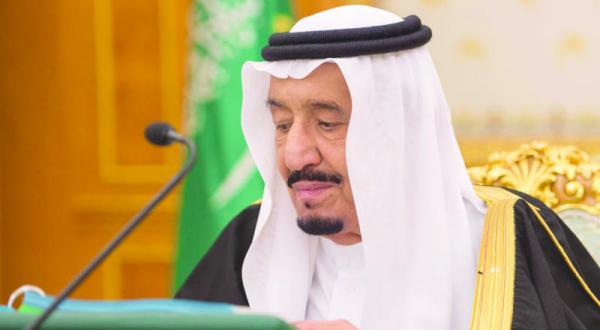Riyadh-Saudi Arabia’s Council of Ministers on Monday reaffirmed the decision of the Gulf Cooperation Council (GCC) to consider Hezbollah militia’s leaders, affiliated factions and organizations as “terrorists” during a session that was chaired by HRH King Salman at Al-Yamamah Palace in Riyadh.
The Cabinet noted that the GCC took the decision against Hezbollah “after taking into account its continuing hostilities and its flagrant violation of sovereignty of Gulf states and its destabilizing of regional security and stability as well as its practices, which are contrary to humanitarian values and international laws.”
The Cabinet said that it valued the strong message of the declaration, which condemned the attack on Saudi missions in Iran as well as the Iranian activities aimed at destabilizing the security and stability in Bahrain and other Arab states.
At the beginning of the session, the Custodian of the Two Holy Mosques briefed the Cabinet on the outcomes of his talks with the Prime Minister of Malaysia Mohammad Najib Abdulrazzak, stressing deep bilateral relations between the two sisterly countries and the keenness of both sides to enhance these relations in various fields.
Saudi Minister of Culture and Information, Dr Adel bin Zaid Altoraifi pointed out that the Cabinet welcomed the statement of the General Secretariat of the Council of Arab Interior Ministers issued at the meetings in the 33rd session of the Council of Arab Interior Ministers in the Tunisian capital.
The Cabinet welcomed “Tunisia Declaration” reiterating its strong condemnation of terrorism and its supporters and financiers.
It condemned the state’s terrorism practiced by Israel in the occupied Palestinian territories, the attack on the Saudi Embassy and its Consulate in Iran, and Iranian activities aiming at destabilizing the security and stability in Bahrain and a number of Arab countries.
The Cabinet also denounced dangerous practices and acts carried out by the terrorist Hezbollah party to destabilize security and social peace in some Arab countries.
It also welcomed the declaration’s full support for the measures taken by all member states to fight Al-Qaeda and ISIS terrorist organizations and its full support for the Arab coalition and appreciation of the coalition’s efforts being exerted for supporting legitimacy in Yemen and confronting the terrorist Houthi militias.
Following the Cabinet’s session, Dr Adel Altoraifi commended the relations of friendship and close cooperation between Saudi Arabia and France, their development at all levels and their common desire to develop new fields of cooperation.
He also noted that the Cabinet appreciated the joint statement issued following the official visit of Crown Prince Mohammed bin Nayef bin Abdulaziz Al Saud, Deputy Premier and Minister of Interior to France and his talks with President Francois Hollande and other senior officials.
The statement expressed the great convergence of views between the two sides on regional issues and possible ways to enhance international security and stability.
Moreover, the Cabinet reiterated the contents of the speech delivered by Crown Prince Mohammed bin Nayef bin Abdulaziz Al Saud, Deputy Premier and Minister of Interior, and Honorary President of the Council of Arab Interior Ministers at the meeting and his confirmation that “security is the foundation of peace and stability and without it, balances are destabilized, rights are violated and countries are lost.” HRH Prince Nayef added that combating crime in its intellectual development and behavioral impact is a common responsibility backed by social awareness and security efforts.
On the other hand, the Cabinet re-emphasized the contents of the speech delivered by the Kingdom of Saudi Arabia before the 31st session of Human Rights Council in Geneva.
Back then, Saudi Arabia confirmed its commitment to the promotion and protection of human rights based on its approach derived from the principles of Islamic Sharia, which necessitates these rights.
The speech tackled serious challenges affecting human rights in different parts of the world, and it indicated what has been witnessed by the Kingdom of ongoing development process reflecting its firm belief in the importance of comprehensive development that focuses on human beings as the basic core of development.
The Kingdom expressed great interest in the principle of full independence of its judiciary laws and the need to respect the judicial system and the non-acceptance of intervention in the functioning of these laws, their procedures or provisions, and based on this principle, the Kingdom does not accept any interference in its judiciary or its independence.
The Cabinet decided to authorize the Crown Prince, Deputy Premier and Minister of Interior, or his deputy, to discuss with the Nigerian side a draft security cooperation agreement between Saudi Arabia and Nigeria, sign it and submit the final version for further constitutional procedures.
The Cabinet also authorized the Deputy Crown Prince, Second Deputy Premier and Minister of Defense, or his deputy, to discuss with the Djiboutian side a draft agreement between Saudi Arabia and Djibouti on cooperation in the military field, sign it and submit the final version for further statutory procedures.
The Cabinet approved the implementation of the decision of the Supreme Council of Gulf Cooperation Council for Arab States that was issued in its 30th session, which was held in Kuwait on 27-28/12/1430 AH.
It also approved the decision of the Supreme Council of Gulf Cooperation Council for Arab States that was issued in its 35th session, which was held in Doha on 17/02/1436 AH on the adoption of Muscat document for unified system (law) for real estate in registration of the Gulf Cooperation Council for Arab States as a guideline for a four-year term.
Furthermore, the Cabinet authorized the Minister of Finance, or his deputy, to sign a draft agreement between the Kingdom of Saudi Arabia and Georgia on the avoidance of double taxation with respect to taxes on income and capital and prevention of tax evasion, in addition to attaching draft of “Protocol” project, and then submit the final version for further legislative procedures.

